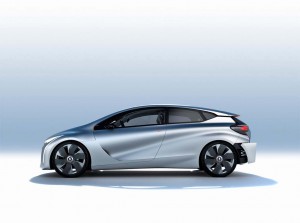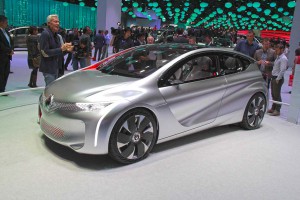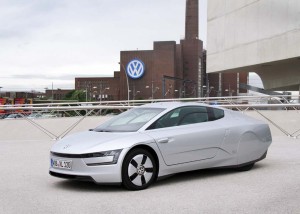When Volkswagen announced plans to go into production with its 261 mile per gallon XL1 it seemed unlikely any manufacturer would be able to top it. Perhaps, but Renault is ready to come close with the new three-door Eolab concept vehicle it plans to unveil at the Paris Motor Show next month.
The French hatchback will only be able to manage a mere 235 mpg, according to Renault – but it also should deliver nearly twice the power of the anemic German mileage champ.
For now, the real difference is that Volkswagen is rolling out 250 copies of the XL1 where Renault plans to use the Eolab as a test bed for technologies it says it might bring to market in the near future.
Its name an amalgam of Aeolous, the Greek god of the winds, and Laboratory, the Eolab adopts just about every possible method known to improve fuel efficiency, starting with a variety of ultralight materials – including high-strength steel, aluminum, magnesium and composites – that hold its total weight down to an astounding 400 kilograms, or just under 880 pounds.
(Toyota teases new C-HR crossover concept before Paris preview. Click Here to learn more.)

Renault engineers turned to lightweight materials, advanced aerodynamics and a new plug-in hybrid system to achieve Eolab's mileage.
The roof, for example, is made entirely of magnesium, saving nearly 10 pounds compared to a steel design. The Eolab also features thinner glass and LED lighting that further reduce weight. It even saved about 32 pounds by doing away with the brake system’s master cylinder.
“Saving weight was a virtuous circle since it enabled the size, and therefore the cost, of the prototype’s chief assemblies (engine, battery, wheels, brakes, etc.) to be kept low,” as well, Renault explains.
Aerodynamics have become critical to industry efforts to improve fuel economy, even with the biggest, heaviest luxury sedans and supercars. Eolab features a sloping roof and slender tail to reduce wind drag, while also adopting a number of active aero components to reduce the concept’s drag about 30% — achieving an almost unheard of drag coefficient of just 0.235.
(Infiniti set to debut new Q80 Inspiration flagship concept. Click Here for a closer look.)
These include a system that can open or seal off the wheels, increasing air flow only when needed if the brakes heat up. And the body rises or lowers automatically depending on road and driving conditions. There is an active spoiler and lateral vanes that act like an aircraft’s ailerons.
The third critical element is the introduction of the new Z.E. Hybrid system. Short for “zero emissions,” this plug-in gas-electric drivetrain consumes the equivalent of just 1 liter of fuel for every 100 kilometers of driving, 235 mpg in U.S. lingo. It also can achieve more than 37 miles on battery power alone, at speeds of up to 75 mph.
The 1.0-liter, three-cylinder gas engine produced 75 horsepower, while the electric side of the driveline makes another 68 hp. The entire diesel-electric package under the hood of the Volkswagen XL1, by comparison, turns out just 74 hp.
But VW is actually putting its technology into production. Renault simply says its hatchback concept features “100 new and realistic technological developments that are designed to be introduced on upcoming Renault vehicles.” It notes it has plans to introduce a 2-liter car – one yielding about 120 mpg – by 2020.
Making all 100 of those new technologies work will be a challenge. But the real issue is one of cost. The VW XL1 is going for roughly $170,000, far more than a motorist could ever expect to save on gas, even with a car so fuel-stingy. The question is whether Renault, or any other manufacturer, can deliver a 1-liter car at a price tag the average motorist would ever be able to justify.
(Senate panel blasts NHTSA chief for failing to prevent GM’s recall problems. Click Here for the story.)


